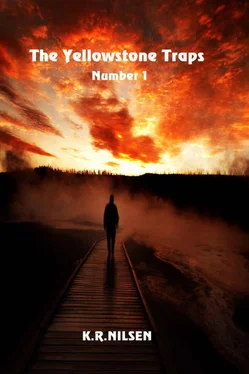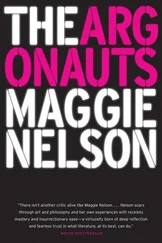Harland heaved and erupted in a coughing spasm, lungs sloughing fluids to their lower chambers. When the coughing seizure abated, the farmer threw his head back and gulped air. “This Yellowstone thing has me beat. It’s going to bury me.”
Abel broke his silence. “It starts getting better when this boat gets to town.”
Harland shrugged and lowered his chin to his chest once again. “I don’t see it. Can’t plow up a God-forsaken volcano.”
Throttled down, the little lake steamer slowed and drifted the final 200 feet to the lakeshore below the silo towers and the old Sweet Spring Brewery. Max pulled a rope attached to a hollow tube affixed to the funnel. Steam screamed through a whistle, reminiscent of a cannonball steam locomotive on a long lost rail mainline. Max let loose three loud toots, each echoing down the length of the lake and dying away without fanfare.
The shallow keel steamer edged the shore and the raft grounded itself in the shallows. Harland eased himself over the side of the craft, splashed down up to his boot tops and moved onshore. Circling his hands about his mouth he hollered for the coop manager, Jim Bottomly, hoping the man might be in the vicinity. The farmer received an echo in response, his voice booming off concrete and brick.
The farmer hurried away toward the Sweetly Primary School, Abel, Winnie, Max and the others watching him go. There were crates to unload and haul into the brewery. Perhaps Harland could locate a few local citizens and persuade them to help with the task of moving a short ton of produce, greenhouse fruits and cheese and distributing it to the many in need.
Chapter One Hundred-Fourteen
Sweetly’s schoolhouse lay broken, comatose in the stone dust landscape, upstaged by the animated smoke streamers rolling off the tops of the grain elevator silos. Nothing moved within. Harland yanked the entrance door wide, lunged into the hall and pulled up, the acrid smell of ammonia from decomposing urine so sharp the stench stung the eyes and sinuses.
Classroom to classroom the farmer lurched, kicking clothing, soiled bedding and children’s toys aside. Each space yawned lifeless and cold, the corn stoves set up to heat several rooms dead for lack of generator electricity to run their augers and fans. Every call for attention went unheeded.
A small flag of the United States hung from its staff on a wall-mount holder in the last classroom Harland entered, the red stripes the only remaining trace of vibrant color in the chamber. The farmer reached for it, pulled down the banner and, with care, ran his rough hands gently over the fabric, the texture pleasing to the touch. He buried his face in the stars and stripes.
“Where is everyone?” he mumbled into the nation’s symbol.
Eastbound on Main Street, Harland hustled across the Burlington Northern tracks, drifted over again with blowing ash, and trudged into the heart of Sweetly’s few downtown blocks. The door to Ester’s Café lay back against an exterior wall, giving free passage to the prairie wind so it might have its way with Sweetly’s lone eatery. Harland inched through the opening cautiously, as if not wishing to be seen. Volcanic powder infested the one business in town that Harland had frequented most winter days for thirty years to sip coffee and to catch up on local gossip and farm news. Instead of taking a seat at the counter, he stepped around behind it. Ten thousand cups of coffee over all those years and not once did he ever venture around to the business side of the counter to see what Karen, the waitress who poured her weak coffee from an endless pot, worked with every day of her working life. He could see her handiwork now, stout ceramic coffee mugs stacked and aligned, heaps of cheap place-setting silverware, well-thumbed menus and grease-stained breakfast cards, dish trays, and the rest. She had kept her workspace orderly. It was neat now, except for the ash dust overlay.
The counter presented a uniform coating. Nothing had disturbed the dust, not a fingerprint, not a smudge, a smear or a drop of something. No one had tended to a patron for many weeks, the gray talc-like substance told Harland as much.
A revolving stool took Harland’s poundage, the counter his elbows. The weight of his head seemed suddenly too great to support; he lowered his forehead into his hands to seek relief from the burden.
Chapter One Hundred-Fifteen
Thrusting its massive head side to side, a heavy bull bison shoved away a foot of snow so that it could get at the prairie grasses on the Alberta plains east of Stand-off Creek. When it had cleared a swath, it cropped the plants and chewed slowly in a bid to keep full its huge four-chambered stomach.
Benjamin White Elk advanced on the buffalo, one of hundreds in the fine North Piegan tribal herd taking up winter residence low in the river drainage. The great creature kept its wooly head and shoulders into the blustery wind, an ancient strategy that saved the animal precious energy during long winter months. White Elk approached from upwind, and the animal soon caught the scent of the human and raised its head to see what possessed such a strange odor. A two-legged creature had managed to close within twenty feet. The burley bison blinked.
“Don’t you worry yourself, iinii,” White Elk called out to the animal. “I have come to talk, just to talk.” The bull stood perfectly still, its barrel chest rising and falling and clouds of white vapor exhausting from its nose. “We are old friends, you and I. We have known each other forever. So you are in good company.”
The bull snorted loudly and turned its head to focus one eye on White Elk and to see if others of its kind were still near. It began to chew its cud, a good sign. It did not seem to be troubled.
“My people, buffalo, they used to be tied to you, like a mother is tied to her child by the cord at birth. Where you went, we went. When you rested, we rested. When you drank at the river, we drank. It was like that, once. We were inseparable.
“What happened to us, huh? We were both lost, you and I. The Europeans separated us. We have been wandering ever since. They changed the world long ago. But no more, iinii. No more.”
White Elk’s clothing chattered loudly in the icy wind, but he was comfortable in the teeth of the weather. It was a clean cold, free of the gray dust. The bison was immune to the sharp wind-chill.
“There is something you should know, my old friend. The world has changed again. There is a place many days from here. Yellowstone, it is called. It spits fire and rock dust over the earth and hides the sun. This early cold, it comes from that place. The whitefaces who stepped between you and me long ago, they are leaving this country now. They cannot live here without their cheeseburgers, their soda, the gasoline, and the foolish television. Yellowstone is driving them away.
“But we can live here, you and me. We can return to the life of the old ones, to the old ways. We have a chance to live as we always did, when there were ten thousand of you for every one of us.”
The bull pawed the ground and rammed its head into the snow. When it brought its head up, it was heavily coated with white fluff.
“I know this will come to be, iinii. The ponoká, the one for which I am named, he came to me and told me. He told me that you and I will live side by side again.”
The massive ungulate shook its great hump. Snow cascaded from its hide. When it finished freeing itself of its white mantle, the bison resumed its vigil of the two-legged creature.
“What do you think of that, iinii? You let me know when you can, huh? I’ll be here. I’ll wait for your answer. I am very patient.”
Chapter One Hundred-Sixteen
Читать дальше










